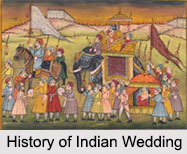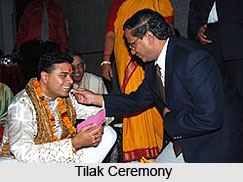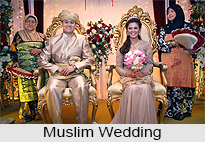 Muslim Wedding Rituals are best known for inviting and welcoming the guests. Muslims observe colourful marriage customs in different parts of the world depending upon their local cultures and traditions. Marriage ceremonies are organised in a grand way. Besides, the bride and groom, their families, friends and relatives also enjoy the marriage events with different rituals. Muslim wedding rituals usually extend up to three days. Their marriage rituals mainly revolve around the major custom of approval of the competent parties in front of witnesses. The marriage venue in Muslim weddings does not have any particular rule and can be either in the bride or groom"s house.
Muslim Wedding Rituals are best known for inviting and welcoming the guests. Muslims observe colourful marriage customs in different parts of the world depending upon their local cultures and traditions. Marriage ceremonies are organised in a grand way. Besides, the bride and groom, their families, friends and relatives also enjoy the marriage events with different rituals. Muslim wedding rituals usually extend up to three days. Their marriage rituals mainly revolve around the major custom of approval of the competent parties in front of witnesses. The marriage venue in Muslim weddings does not have any particular rule and can be either in the bride or groom"s house.
Muslim marriages are not extravagant, but reflect a noticeable expression of love and affection. The various rituals of Muslim Weddings are as follows:
Muslim Pre-wedding Rituals
The ceremony of Muslim wedding starts with "Mangni" or ring exchange ceremony. This is the engagement programme. After changing the rings the bride and the groom are committed to each other to become life partner.
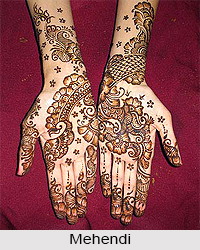 The Mehendi ceremony in Muslim wedding is held at the home of the bride a couple of days before marriage. The female relatives of the girl smear her with turmeric paste to bring out the glow in the bride"s complexion and then Mehendi is applied on the hands of the bride. The event reflects a festive feeling and the women attending the ritual sing traditional songs. According to the pre-marriage customs, the bride is not allowed to step out of the house for the next few days until her marriage. The bride"s cousins sometimes apply a dot of Mehendi on the palm of the groom.
The Mehendi ceremony in Muslim wedding is held at the home of the bride a couple of days before marriage. The female relatives of the girl smear her with turmeric paste to bring out the glow in the bride"s complexion and then Mehendi is applied on the hands of the bride. The event reflects a festive feeling and the women attending the ritual sing traditional songs. According to the pre-marriage customs, the bride is not allowed to step out of the house for the next few days until her marriage. The bride"s cousins sometimes apply a dot of Mehendi on the palm of the groom.
Muslim Wedding Rituals
Welcoming the Baraat is another pre-marital custom which is observed on the wedding day among the Muslims. The groom arrives at the marriage place with his "Baraat" and a band of musicians strike up some traditional notes to announce the arrival. The groom shares a drink of sherbet along with the bride"s brother or relative.
The "Nikaah" or the main Muslim wedding ceremony can be conducted at the home of the bride or the groom, or at any other suitable venue. A Maulvi or the priest in the presence of close family members and relatives conducts the ceremony of Nikaah. In orthodox Muslim communities, the men and women sit separately. The Maulvi reads some selected verses from holy Quran and the Nikaah is considered complete after the Ijab-e-Qubul, which means the proposal and acceptance. The groom proposes and the bride conveys her assent. The mutual consent of the bride and groom is of great importance for the marriage in order to make it legal. The "Nikahnama" is a document in which the marriage contract is registered. To legalise it, the signature of the bridegroom, the bride, the Walis (father of both the bride and groom) and the Maulvi is compulsory. The next stage in a Muslim wedding includes receiving of blessings of the groom from the senior women members by offering them his "Salaam". 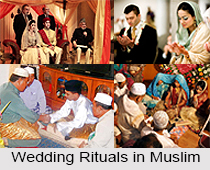
The senior members of the two families sit together and decide the amount of "Mahr" or the nuptial gift on the day of the wedding. The Mahr is an obligatory amount of money given by the groom"s family to the bride.
Dinner, prayers and "Aarsimashaf" are the customs followed on the wedding day itself. Dinner is a lavish spread. Usually, the women and the men dine separately. After dinner, the newly-weds sits together for the first time. Covering their head with a dupatta, they read prayers under the direction of the Maulvi (priest). The holy Quran is placed between the couple and they are allowed to see each other through mirrors.
Muslim Post-wedding Rituals
Wedding Ceremony "Rukshat" is the custom, where the bride`s family bids her a tearful farewell before she leaves her father`s house for her husband`s residence. The custom of welcoming the bride is done at the groom`s house. The Quran is held over the head of the new daughter-in-law by the groom`s mother and then she enters her new home. The "Chauthi" ceremony is conducted on the fourth day after the wedding, when the bride visits the home of her parents. The bride receives a blissful welcome on this day. The "Valimah" is the lavish reception on behalf of the groom`s family. It is a joyous occasion that brings together the two families, their relatives and other well-wishers.
Muslim wedding rituals are some of the most simple and pleasant rituals, where the bride and the groom themselves enjoy amidst the merrymaking of their marriage.


















